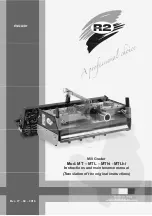
Chapter 4: Routine Use of the Flexcell--Introduction
4 - 1
Chapter 4: Routine Use of the Flexcell
Introduction
This chapter discusses use of the Flexcell in controlled-temperature experiments.
The previous chapter discussed initial assembly of the cell. You perform most of the assembly steps in that
chapter only once, as the cell is first brought into service. This chapter also discusses assembly steps: steps that
you repeat during use of the cell.
Issues such as de-ionized water flow rates, filling and emptying the cell, heating and stirring, and electrolyte
deaeration are also discussed in this chapter.
Fittings in the Glass dome
The Flexcell was designed for versatility. One source of this versatility is the large number of ports on the cell
’
s
glass dome. These ports will accept a variety of accessories.
The standard cell configuration includes a counter electrode, a bubbler (sparger), and a cooling coil. You can
also use these ports for a stirrer, a thermometer, an additional electrode, reagent addition, etc.
Counter Electrode
One graphite counter electrode (P/N 935-00003, 30 cm long × 6.2 mm dia.) is provided with the Flexcell.
Mount it directly in one of the four #7 ACE-
Thred™
ports in the dome using a threaded bushing (P/N 935-
00020) and its associated O-ring.
A second graphite counter electrode may be purchased separately and added to a second port if you require
more uniform current distribution.
You can also use a noble-metal wire counter electrode. Bend one end of the wire into a hook and hang it over
the lip of one of the ports. If you desire a diffusion barrier to slow counter-electrode reaction products reaching
the working electrode, suspend the wire counter electrode in a fritted glass tube. The tube can enter the cell
through one of the #7 ACE-
Thred™
ports or a 24/40 ground-glass joint.
Gas Bubbler
A bubbler/vent tube is provided with the Flexcell. This tube fits in a 24/40 ground-glass joint. If you use both a
stirrer and this bubbler tube, the stirrer enters the cell though the central 24/40 port and the bubbler is placed
in the other 24/40 port.
Use of this bubbler/vent tube is described in the section of this chapter that discusses deaeration of your
electrolyte.
Top-mounted reference ball joint
The glass dome is equipped with a 35/25 ground-glass ball-joint socket. Do not use this port in the
“
standard
”
version of the Flexcell, so the 35/25 port is available for expansion purposes. Your kit includes two
parts to seal this port: a glass stopper (P/N 935-00028) and a plastic ball-joint clamp (P/N 935-00026).
Instructions in other parts of this manual assume that you have used these pieces to seal the port.
Thermometer
You can immerse a standard glass thermometer in the cell through one of the #7 ACE-
Thred™
ports. Use a
threaded bushing (P/N 935-00020) and its associated O-ring.
Reference Electrode
A reference electrode is not included with the Flexcell. This omission allows you to choose the type of
reference appropriate for your chemistry.
Summary of Contents for FlexCell
Page 1: ...Flexcell Cell Kit Operator s Manual...
Page 8: ...Checking for Shipping Damage 1 2...
Page 10: ...Chapter 2 Metal Specimens Checking for Shipping Damage 2 2...
Page 30: ...Chapter 4 Routine Use of the Flexcell Electrode Area 4 10...
Page 36: ...Chapter 6 Troubleshooting Poor experimental reproducibility 6 2...
















































